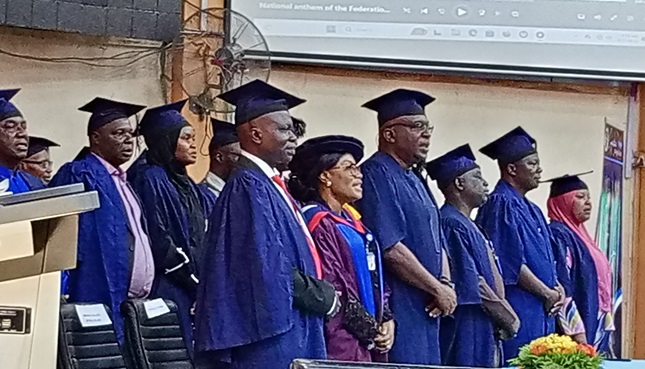Unilorin Professor Advocates for Commercial-Scale Production of Indigenous Microbial Products

According to a news report from Nigerian Tribune, Professor Patricia Folakemi Omojasola from the Department of Microbiology, Faculty of Life Sciences, University of Ilorin, has emphasised the importance for Nigerian industries and microbiology graduates to engage in the commercial-scale production of indigenous microbial products like 'Ogi', 'Iru', 'Okpehe', 'Nono', 'Kunun', and 'Agadagidi'. She noted that these products could benefit significantly from improved shelf life and modern packaging.
Delivering the 261st inaugural lecture of the university, titled “Microorganisms in the Service of Man”, Professor Omojasola lamented that despite the extensive research available, the production of these indigenous products remains localised and small-scale, with outdated traditional methods still in use.
She highlighted the beneficial role of microorganisms in transforming agricultural wastes into valuable industrial raw materials, suggesting that microbial metabolites could be produced at the site of each waste using simple bioreactors, and the products could then be pooled to supply large industries.
The renowned microbiologist pointed out that while microorganisms are often associated with negative impacts, such as epidemics and pandemics, referencing historical events like the Black Death and the Spanish flu, as well as the recent COVID-19 pandemic, they also play vital and beneficial roles in various aspects of human life.
According to Professor Omojasola, “Microorganisms though often associated with diseases, however, play vital and beneficial roles in various aspects of human life and have many valuable uses that can be harnessed in the service of man. These, according to him, include: the production of vitamins, antibiotics, vaccines and other pharmaceuticals for food production, preservation, detoxification, and flavour development through fermentation.”
The inaugural lecturer also said that probiotics are used “to improve gut health; enhancement of soil fertility, plant health and nutrient recycling; degradation of pollutants in air, water and soil through bioremediation; treatment of sewage and wastewater in water recycling for irrigation”.
“Microorganisms are used in various biotechnological applications, including enzyme production, bioprocessing, and genetic engineering”, she said, adding that “enzymes produced by microorganisms are used in industrial processes such as laundry detergents, biofuel production, and pharmaceutical manufacturing”.
She pointed out that microorganisms like Escherichia coli and Saccharomyces cerevisiae are commonly used as host organisms for the production of recombinant proteins and bio-based chemicals. “These are just a few examples of the beneficial uses of microorganisms, highlighting their importance in diverse fields and industries”, she stated.
Professor Omojasola elaborated on the numerous positive applications of microorganisms, including the production of vitamins, antibiotics, vaccines, and other pharmaceuticals.
She said microorganisms are also crucial in food production, preservation, detoxification, and flavour development through fermentation, as well as in enhancing soil fertility, plant health, and nutrient recycling.
While noting that the Inaugural Lecture chronicles her odyssey in researching the roles played by microorganisms in biodegradation, fermentation, food preservation and waste value-addition, the don said there is a need for increased funding for microorganisms research because addressing challenges in microbial-mediated transformations of agricultural wastes requires increased funding and support for researchers, including up-to-date research technology and reliable power supply.
Professor Omojasola explained the promising avenue of using microorganisms to transform agricultural wastes into raw materials for industrial applications, noting that this process not only mitigates the burden of agricultural waste pollution and disposal but also contributes to the development of bio-based industries and reduces dependency on fossil fuels. She said microbial biotechnology promotes a circular economy by converting waste streams into valuable industrial inputs, enhancing resource efficiency, and reducing environmental impact.
She opined that proper and effective implementation of food preservation strategies requires interdisciplinary collaboration among stakeholders across the food industry, academia, and government. Hence, she advocated special collaborative relationships between the universities, research institutes and the industry, saying, “This will play a crucial role in driving innovation, advancing knowledge, and fostering economic development. These collaborative partnerships, according to her, will bring together diverse expertise, resources, and perspectives that will address our challenges, accelerate scientific discoveries, and translate research findings into real-world applications”.
“The unlocking of the full potential of African indigenous plants as sources of antimicrobial agents requires concerted efforts and collaboration across multiple disciplines. It is essential to encourage such partnerships to fully develop novel drugs that will be effective in combating antibiotic resistance”, Prof. Omojasola noted.
Speaking on her research contributions, Professor Omojola explained that while Nigeria generates 183.3 million tons of agrifood waste annually, causing environmental pollution, her research focuses on transforming these nutrient-rich wastes, such as cassava peels and other crop residues, into valuable industrial products like bioplastics, biofertilizers, food additives, antibiotics, and enzymes through microbial biotransformation. She added that her work demonstrates the beneficial role of microorganisms in waste management and resource utilisation.
Cloud Tag: What's trending
Click on a word/phrase to read more about it.
Lanre Olosunde Busari Toyin Isiaka Saheed Akinwumi Abdulmumini Sanni Jawondo AbdulGaniyu Kareem Ahmad Lawan Smart School Vishvas KOZ Tractors Razak Atunwa Jide Ashonibare Malete Soffiyyallah Kamaldeen Idris Garuba Gbadeyan Gbadura Yomi Taofik Mustapha Offa Grammer School Rasheed Jimoh Vasolar-Kwara Company Ltd Yusuf Abdulkadir Segun Olawoyin Elelu Lanre Issa-Onilu University Road Kwara State Internal Revenue Service AbdulFatai Adeniyi Dan-Kazeem KWASSIP Bamidele Adegoke Oladimeji Ilesha Gwanara Road Kola Adesina Usman Rifun CUTI Gambari AbdulRazaq Abubakar Jiddah Abubakar Lah Jani Ibrahim Oke-Oyi Ramadhan Ayinde Oki The Herald Elerin Of Adanla Ayinke Saka ITEM 7 Rihanat Ajia Shehu Salau Kwara Pdp Ola Falade Oye Tinuoye Salihu S. Yaru Sardauna Of Ilorin Nigerian Medical Association CACOVID Palliatives Abdulrauf Aliyu Egbejila Imam Gambari Ilorin Talaka Parapo Dar-Al-Handasah Consultants Ltd Buhari Ibrahim Mohammed Maigidasanma Abioye Bello Moshood Kashimawo Abiola Gbenga Adebayo Justina Oha Edu Dan Iya Manzuma Tafidan Kaiama Yinka Aluko Dumagi Abdulazeez Uthman Michael Nzwekwe Biliaminu Aliu Alaro Kayode Bankole Ahmed Mohammed Rifun David Oyedepo Mukhtar Shagaya


